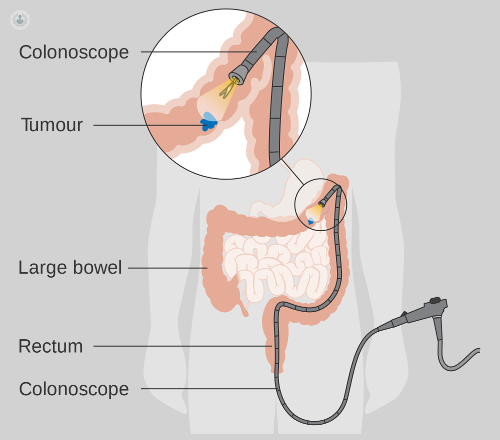What are the symptoms of bowel cancer and how is it treated?
Written by:Bowel cancer is a form of cancer that affects the colon and rectum. It is the fourth most common form of cancer in the UK, following breast, prostate and lung cancers. Mr Chetan Bhan, an expert colorectal surgeon, explains the most important details of bowel cancer, from signs and symptoms to treatment.
What is bowel cancer?
Bowel cancer is a term used for cancer that begins in the large bowel or intestine and depending on its site, it may be termed either colon or rectal cancer. It is a very common cancer and affects 41,000 new patients annually. It affects both men and women equally and the majority of sufferers are aged over 60.
The underlying cause of bowel cancer is still unknown. However, we know that it develops from a disordered growth of cells within the lining of the large intestine, named polyps. Ten percent of these polyps will go on to become a bowel cancer. However, polyps, if found, can also regress back to normal, healthy bowel lining.
Polyps themselves, in the majority of cases, are asymptomatic and are found on routine colonoscopic examinations of the large intestine. During this examination, they can also be removed and if found, patients would undergo a surveillance program which may be a further colonoscopy after one or five years depending on the number or size of polyps found.
What are the symptoms of bowel cancer?
The symptoms of bowel cancer are often very subtle and is unlikely to make you feel ill. It is also unlikely to make you lose excessive weight which is a common occurrence in a number of other cancers.
Ninety percent of people will suffer from the following symptoms:
- A change in bowel habits (e.g. more looser stools or an erratic bowel habit)
- Tummy pain or bloating
- Rectal bleeding (bright red blood or darker blood), however, red blood is often associated with haemorrhoids and is called anorectal bleeding.
Constipation or passing harder stools is not generally associated with symptoms of bowel cancer.
How is bowel cancer treated?
Diagnosing bowel cancer involves a colonoscopy, biopsy and a CT scan, which checks to see if the cancer has spread to other organs, such as the liver or the lungs. The mainstay of treating bowel cancer is surgery. This can be either an open operation where the tumour is removed with its lymph glands through a long incision to the middle of the abdomen.

More recently, innovations have been made with the keyhole, laparoscopic approach to surgery. This can be performed for roughly 70% of tumours by a specialist surgeon. The tumour and lymph glands are immobilised through four to five 1-2cm incisions and through a small 5cm incision, the specimen is extracted. The cosmetic result is better and the length of stay in hospital is significantly reduced.
Once the specimen is removed, it is analysed and if the lymph glands are deemed to be involved, the patient may be offered chemotherapy, which can last up to six months.
In a small proportion of patients who have rectal cancer, radiotherapy may be used. This is a technique where radiation is used to kill cancer cells and the hope is that the rectal tumours can be reduced in size so that they can be safely removed, which is still the mainstay of treatment for rectal cancers.
If you would like to find out more, make an appointment with a specialist.


